Filipino Catholics thank God for joyous Easter this year
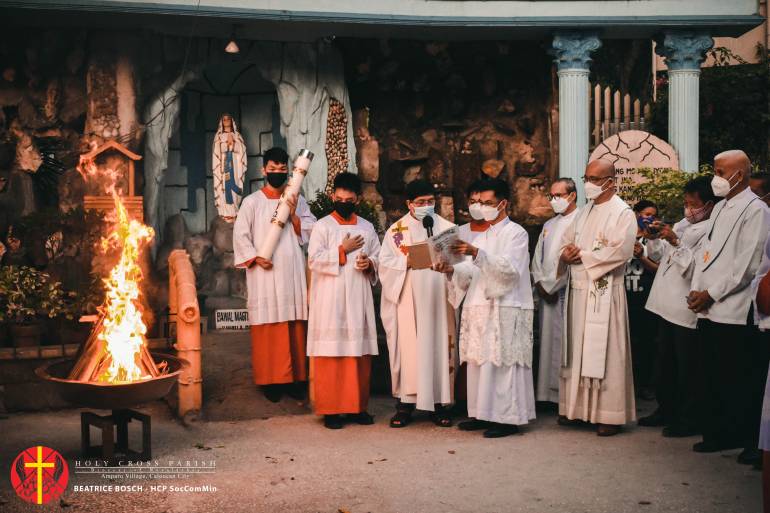
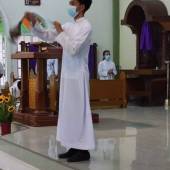
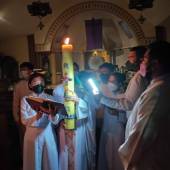
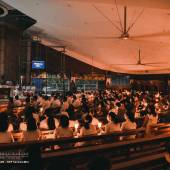
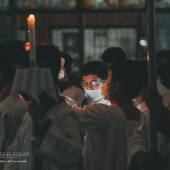
After a two-year gap, Filipino Catholics are grateful to God for the joyous Easter celebrations this year.
With the ease of pandemic restrictions in the Philippines and fewer cases of Covid-19 infection reported, Catholics were overjoyed to participate in Lenten observances, Holy Week services, and Easter celebrations.
RVA News interviewed some Catholics to find the mood.
“For two consecutive years ago, Catholics were not allowed to enter churches even for the Holy Week. It felt emotional serving in an almost empty church amid the pandemic when the cases of Covid-19 were significantly higher,” said Let Benedictos.
She currently serves as the Parish Pastoral Council Secretary at Holy Cross Parish, Amparo Village, Caloocan City, Diocese of Novaliches, Metro Manila.
“And now that people are allowed to attend religious services in churches, it felt kinda nerve-wracking singing the Psalm 118 for the Easter Vigil Mass,” she said.
She also thanked God for the gift of voice. She was grateful to God also for the gift of old and newfound friends who also took the time to share their time and talents.
“It was kind of overwhelming seeing new and old faces after each service (not to mention the sleepless nights in between preparations. I wanted to talk to everyone, but everyone was just so happy to see each other that I only had a few seconds to spare to greet them,” said Benedictos, who is also the head of the Social Communications Ministry at the parish.
“We all praise God for the opportunity to celebrate Easter this year as things have improved for the better. As long as God is with us, all shall be well,” she added.
For Caryl Ingrid Balaoing, president of altar servers at St. Jude the Apostle Parish, Diocese of Tarlac, Easter this year made him feel delighted and hopeful since he was able to celebrate it with other servers and a large number of people because the restrictions have been reduced.
Some religious practices such as the ‘Salubong’* were permitted after two years which gave him hope that things were going back to normal, at least to some extent as of now.
“This also gave me hope that things will be better and we would be able to perform it again in the upcoming years,” she said.
Likewise, Mark Andrei Macasieb, an altar server of the same church, echoed the same sentiments.
“Celebrating Easter this year feels lighter and livelier compared to the previous year wherein we have to celebrate it indoors,” he said. “This year we get to celebrate it without restrictions though there are health protocols to follow. It feels better if we celebrate it this way.”
Easter this year was like a breath of fresh air for many.
“The two years of the pandemic made me feel like having entered a very long tunnel. Yes, there were Masses here and there and most were online. But sacramental celebrations are physical celebrations,” said Father Ilde Dimaano, parish priest at St. Mary Euphrasia Parish in the Archdiocese of Lipa, Batangas province.
As the government eased the mobility resections, one has the opportunity for more social interaction, hear murmurs, children running here and there, seniors intently listening to gossip. And that is how Filipino Easter celebrations are done, he explained.
“This Easter is a breath of fresh air so to speak. Churches were almost filled again. And you now hear voices responding to the liturgical summons, "And also with you!" The words Alleluia had taken a novel feeling in me. Truly, the Lord is risen,” the priest said.
The Philippines is a mostly Catholic nation with over 110 million population. It is the largest Catholic country in Asia.
[* The “Salubong” is an Easter tradition in the Philippines that reenacts the meeting of the risen Jesus and his mother, the Blessed Virgin Mary, on the first Easter morning.]
Radio Veritas Asia (RVA), a media platform of the Catholic Church, aims to share Christ. RVA started in 1969 as a continental Catholic radio station to serve Asian countries in their respective local language, thus earning the tag “the Voice of Asian Christianity.” Responding to the emerging context, RVA embraced media platforms to connect with the global Asian audience via its 21 language websites and various social media platforms.














